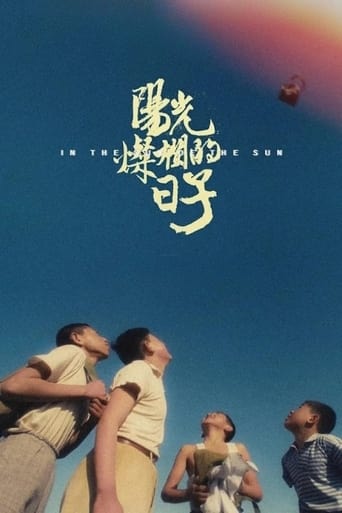Howard Schumann
Due to lack of adult supervision during the Chinese Cultural Revolution, the mischievous boys of military fathers are free to spend their summer left to their own devices. Too young to join other youths working in the countryside, they spend their time riding their bikes, getting into gang fights, picking up girls, and asserting their masculinity. Chosen as one of 100 best Chinese films of the century by Asia Weekly Magazine, Wen Jiang's In the Heat of the Sun is a coming of age story set in Beijing in the 1970s after the Red Guards had been disbanded. The first film by a sixth generation Chinese director, it played to packed audiences of young people when it first opened in Beijing in 1995, but has never been released in North America.In the Heat of the Sun is based on the novel "Wild Beast" by Wang Shou, a controversial Chinese author who has written many stories about rebellious teenagers. The film is a subjective recollection about a group of friends who meet when their Army dads are shipped out to support Chairman Mao in 1969, recollections embellished by the narrator's fanciful memory. Steeped in eroticism and youth violence, it is a sharp turn from the melodramatic epics of the early 1990s that interpreted China's past as a time of sexual repression. Jiang does not wallow in marketable clichés or make a special appeal to Western audiences but, like the young people in the film, imparts to the work a freshness and authenticity that sets it apart.The film stars 17-year old Yu Xia as "Monkey" Ma Xiaojun, a rebellious teenager who is a stand-in for the director as a young man. Xia (whose name translates as 'Summer Rain') won the award for best actor at the 1994 Venice Film Festival, the youngest actor ever to win this award. Narrated by the director who is also a popular Chinese actor, the opening narration tells us that "Peking has changed so fast. In 20 years, it's become a modern city. Almost nothing is as I remembered. Change has wiped out my memories. I can't tell what's imagined from what's real." The film's leitmotif is introduced almost immediately and we understand the reason for the title. "My stories always take place in summer", the narrator continues."The sunlight was so relentless, so bright, that our eyes were washed in waves of blackness. In the Heat of the Sun. In the raging storms of Revolution. The soldiers' hearts turn towards the sun." During that summer, Monkey acts out fantasies that make him feel like a hero and talks about characters from Russian novels and films dealing with revolutionary heroes searching for glory. He imagines himself standing up to bullies and enemies of the state in an imagined World War III and, in his fantasy, is willing to die for his country and his honor with women. He fights for his group, sending a rival gang member to the hospital for a month, sneaks into people's apartments with a self-made key (though he never steals anything), and watches films banned as inappropriate for children by the authorities.Monkey's main focus, unsurprisingly, is a girl whose portrait hanging on the wall of an apartment he let himself into is immediately captivating. His pursuit of Mi Lan (Ning Jing), who is a few years older than him, is, however, fraught with rejection, jealousy of group leader Liu Yiku, and passion that veers out of control. Although Jiang problematically redefines the Cultural Revolution as a period of spontaneity and freedom rather than dislocation and chaos, the film is not about politics but about the perilous transition from adolescence to maturity. Unlike other coming of age films, it is not a reflection of sadness and longing but an odyssey filled with the excitement of a new found freedom and revolutionary ardor.
QiDi
Since the first time I saw "Yangguang Canlan de Rizi" ("In the Heat of the Sun", actually if translated directly from the Chinese name, it would be "Bright Sunny Days"), it became one of my all time favorites. Depicted in a yellowish color, the movie is full of mood of reminiscence. Though I was born right after the "Cultural Revolution"(1966-1976), I heard a lot about it from the older people. Days of those years were humdrum at large but might be wonderful for youngsters. Schools were loose or even dismissed, students worried nothing except their adolescent affairs. Just as eagletc, another reviewer on this board, described: "there wasn't so much on concern in our mind, hence fighting against the children from other section in the military region became the only extracurriculum activity".What's great of this movie is that it exhibits to us so vividly the growth experience of one generation in a somewhat wild and beautiful way. It may be very touching for those who are acquainted with that period of Chinese history but may confuse and bore those who are not. Jiang Wen is not only a talented actor but also a genius director. There's another movie from him I also love, "guizi lai le". I would like to mention Wang shuo, the writer of the original novel "Dongwu Xiongmeng (Animals Are Savage)", who is the most creative contemporary novelist in China.
yingyuan
It is not only a time for people over 40 years old in China to recall, but a touching story for everybody to get moved - a vivid reflection of the impulse and passion of teenagers in that restive years of Cultural Revolution of China. Lots of pain but always a time to remember. Salutation to Director Jiang Wen, who remains also the top contemporary actor in China.
oliverlee97
I saw this film for three times, 6 times of videos. this is the best chinese film i saw. the beautiful music is from Mascarnni's Rustical Calvary(???) also used in Raging Bull by Martin Scorsese

